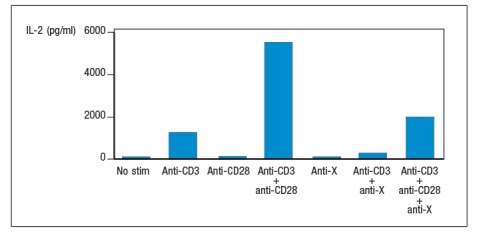Synthesis Question: Co-Stimulatory and Inhibitory Receptors Modulate Antigen Receptor Signaling
Synthesis question: Co-stimulatory and inhibitory receptors modulate antigen receptor signaling in T and B lymphocytes. A new receptor is discovered, expressed on the surface of T cells, and called 'X'. An antibody to X is generated, and used in T cell stimulation experiments. In these experiments, antibodies to the TCR complex (anti-CD3) and to CD28 (anti-CD28) are known to stimulate signaling through those receptors, as does the antibody to X. The data from an experiment measuring IL-2 secretion by the T cells stimulated with different combinations of antibodies are shown in Figure. 
a) Does stimulation of receptor X alone induce IL-2 production by T cells? Does it enhance or inhibit TCR signaling? Indicate the evidence supporting your answers.
b) If you examined the amino acid sequence of the receptor X cytoplasmic tail, what motif would you expect to find?
Biochemical studies show that when receptor X is stimulated, a tyrosine residue in the cytoplasmic tail becomes phosphorylated.
c) From these data, what are the two most likely signaling proteins that might be recruited to receptor X when it is stimulated? Does the T cell stimulation data shown in the graph rule in or out either of your candidate proteins? Why or why not?
d) Describe a biochemical experiment (analysis of proteins) that would indicate which enzyme is recruited to receptor X when it is stimulated.
Correct Answer:
Verified
View Answer
Unlock this answer now
Get Access to more Verified Answers free of charge
Q32: Lymphocyte activation leads to robust proliferation and
Q33: BCR signaling on B cells is initiated
Q34: The mechanism by which CTLA-4 inhibits T
Q35: 'Checkpoint blockade' is a therapeutic strategy based
Q36: In patients with 'CD40 ligand deficiency',
Q37: Wiskott-Aldrich syndrome is an immunodeficiency disease due
Q38: TNF-receptor signaling commonly includes several steps
Q39: An important transcription factor activated by
Q40: The immunosuppressive drug rapamycin acts by inhibiting
Q42: BCR stimulation and TCR stimulation generally activate
Unlock this Answer For Free Now!
View this answer and more for free by performing one of the following actions

Scan the QR code to install the App and get 2 free unlocks

Unlock quizzes for free by uploading documents